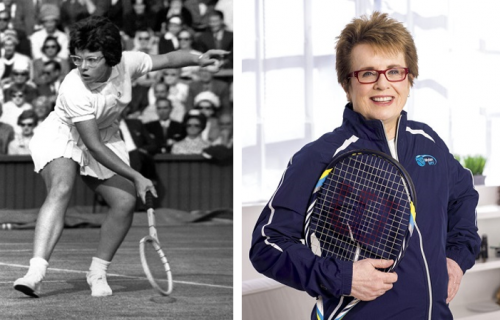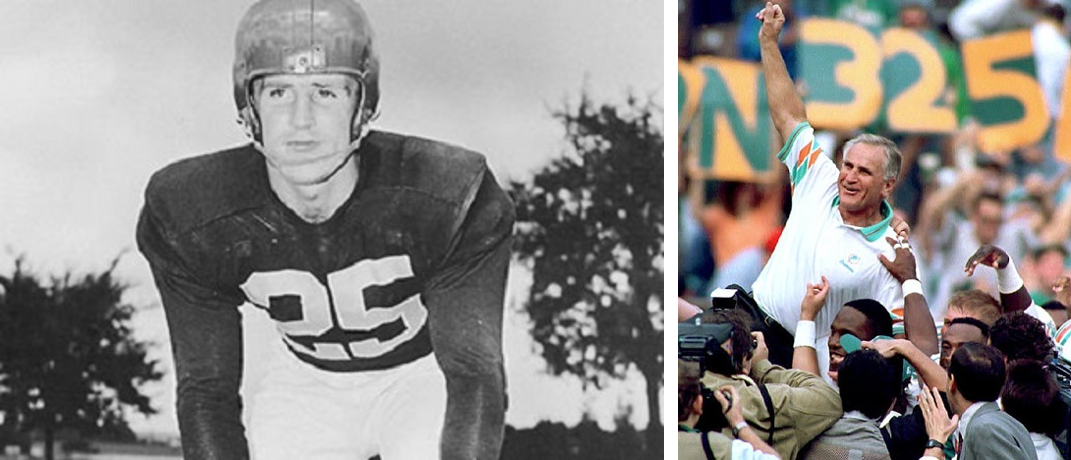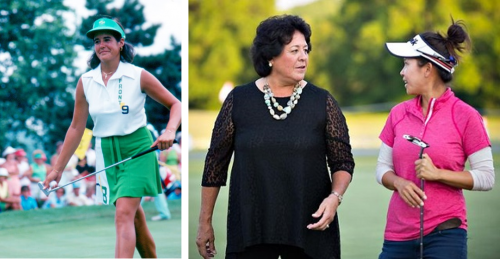Living Legends: 5 Retired Athletes & Their Senior Success Stories
March 1, 2019
“Retirement” may evoke thoughts of snowbird winters in Boca Raton – of seniors who finally ditched the nine to five and began to enjoy themselves without the stress of the hectic life they moved on from. Retirement may mean age finally becomes a factor that can’t be ignored, and that the overwhelming demands of pre-retirement life must finally be put aside.
Senior citizens who have experienced this life transition have much in common with the retired athlete. For athletes, “retirement” means hanging up the cleats, passing the torch and swallowing the reality of the final whistle. Like retired seniors, athletes who end their sports careers have to come to terms with leaving their normal livelihoods. They may have ailments that hinder them from being what they used to be. They may also find themselves without an outlet for their passion, where they were on top of the world, defeating all odds.
A successful, professional athlete’s core consists of persistence, resilience, determination and strength. This is not lost when they retire, and the same goes for us when we do. So how do retired athletes carry on into the elderly season of their lives? To answer that question, we have compiled stories of five retired professional athletes who exemplify senior citizen success. We hope you are inspired by the stories of their lives.

Alan Page, Age 73
Then:
Alan Page redefined the position of defensive tackle as an NFL football player for the Minnesota Vikings. He had already achieved a national championship with Notre Dame in 1966 before he went on to help the Vikings win four conference titles as a professional. Page was MVP of the NFL in 1971, defensive player of the year twice and was selected to nine Pro Bowls. He played 14 years in the NFL, earning six All-Pro honors, being named NFL Player of the Year and the NFL Most Valuable player in 1971.
Page championed player rights as a leader in the NFL Players Association, a union that fought for better pay and benefits for professional football players. While he tried to accomplish better treatment as an athlete, the media and his team owners were critical of his actions. Page nevertheless continued to be “an exception to every rule,” becoming a dual-sport athlete as a marathon runner, and working at a labor issues law firm – all during his football career.
Now:
While still playing for the Vikings, Page earned his Juris Doctor from attending the University of Minnesota Law School. After a long career in law as a courtroom attorney, he became the first African American to serve on the Minnesota Supreme Court in 1992. He served as an associate justice until 2015, when he hit the court’s mandatory retirement age of 70.
Today, Page and his wife Diane provide financial and mentoring assistance to students of color through the Page Education Foundation. Unexpectedly, Page is also the author of two children’s books: Alan and His Perfectly Pointy Impossibly Perpendicular Pinky and The Invisible You.

Billie Jean King, Age 75
Then:
In 1973, King faced off against 55-year-old Wimbledon champion Bobby Riggs in the famed “Battle of the Sexes” exhibition match. King was 29-years-old then, Associated Press Female Athlete of the Year in 1967 and the first tennis player named Sports Illustrated Sportsman of the Year in 1972. She had triumphed at the French Open in 1972, which made her the fifth woman in history to win the singles titles at all four Grand Slam Events.
And yet, Riggs believed he could beat any woman player, saying “the best way to handle women is to keep them pregnant and barefoot.” In their match, King annihilated Riggs 6-4, 6-3, 6-3 in front of 30,000 fans and 50 million TV viewers – the largest crowd to ever watch a tennis match at the time. Years later, Riggs and King actually became friends.
Over the rest of her career, King managed a record 20 championships won at Wimbledon, and countless other honors.
Now:
King was vocal about issues beyond the court, such has her homosexuality, and especially the treatment of female athletes. She campaigned for equal prize money in men’s and women’s games fearlessly, then in 1973 became the first President of the women’s players’ union – the Women’s Tennis Association.
King is considered “the figure most responsible for the growth of tennis in the United States.” She is now involved in the Women’s Sports Foundation and the Elton John AIDS Foundation. She is also the founder of the Billie Jean King Leadership Initiative and co-founder of Mylan World TeamTennis, a mixed-gender professional tennis league.
King has had her stint as an actress fairly recently as well. In 2007, she starred as a Judge in Law and Order and appeared in Ugly Betty in 2009.

Don Shula, Age 89
Then:
Don Shula can be said to have actualized two athletic careers: one as an NFL player and the other as an NFL coach. The former boasts career achievements like a championship game appearance with the Cleveland Browns. In the middle of his rise as an athlete, Shula served in the Ohio National Guard for 11 months during the Korean War. He returned to football with the Baltimore Colts, and unfortunately suffered a broken jaw. Shula was playing with the Washington Redskins when he retired in 1958.
This could have been the end of a staggered athletic career for Shula, but he chose to continue with football as a coach. His first coaching job was as an assistant at the University of Virginia. In just two years, he was the defensive coordinator for the Detroit Lions in 1960. Shula went on to revisit the Colts, serving as Head Coach and compiling a 71-23-4 record, two Coach of the Year Awards and an NFL Championship in 1968.
By 1970, the end was still nowhere in sight for Coach Shula. From age 41-66, Shula was the Head Coach of the Miami Dolphins. In 1972, the Dolphins went undefeated 17-0-0 then proceeded to take the Super Bowl title, making them the only team to win with a perfect season. The next year, they won the Super Bowl again. Overall Coach Shula has set the record for career wins at 347, making him the winningest coach in NFL history.
Now:
Shula and his wife Mary Anne now live in an Indian Creek village recluse, leading much simpler lives. But Shula still attends every Miami Dolphins game to visit the coaches and players on field. He films commercials and has even appeared on the HBO show, Ballers. Shula has become an accomplished businessman who co-founded the Shula’s Steak Houses LLLP chain and opened Shula’s Hotel & Golf Club in Miami Lakes. In honor of his late wife Dorothy, the Don Shula Foundation raised money for breast cancer research, which led to a $1.5 million donation to the Moffitt Cancer Center.
In May, 2016, Shula was hospitalized because of fluid retention and sleep apnea, two common problems for the elderly. He was released soon after, and now receives the support and well wishes of an entire football community. Fortunately, Coach Shula made a very welcome appearance at the 2017 Super Bowl.
 Bill Walton, Age 66
Bill Walton, Age 66
Then:
In college, Bill Walton was a star on John Wooden’s powerhouse UCLA team in the early ’70s. Later as a professional, Walton was named the NBA Most Valuable Player in 1978. He was at his prime with the Portland Trail Blazers, yet plagued with injuries including a broken left ankle. After surgery on his foot, doctors said he would never play again.
He ignored them.
In 1978-79 Walton was contracted to play with the San Diego Clippers. Walton went on to improve with the Clipper team over the next two years, then realized his childhood dreams of playing with the Celtics in 1985-86. That season, the Celtics compiled a 67-15 winning record with one of the strongest lineups in NBA history. He retired at age 34 with 6,215 points and two NBA titles under his belt.
Now:
Since his playing days have ended, Walton is now a TV sports broadcaster known as a free-flowing jester. He overcame a stuttering problem to become a successful and controversial commentator for NBC, the LA Clippers, the Sacramento Kings and ESPN. He published a memoir, Back from the Dead: Searching for the Sound, Shining the Light and Throwing it Down in 2016. Walton has undergone nearly 40 orthopedic surgeries in his life, yet is one of the NBA’s 50 Greatest Players and a Naismith Memorial Basketball Hall of Famer.

Nancy Lopez, Age 62
Then:
Nancy Lopez won her first amateur golf tournament at age 13. She was the Golf Writers Association of America Female Player of the year from 1978-79 and in 1985. After winning dozens of tournaments, Lopez crossed the $1 million mark in career earnings in 1983 and gave birth to her first child in the same year. Her 35th career victory was the Sarasota Classic, which led to her induction into the LPGA Tour Hall of Fame. Throughout her professional career, Lopez gave birth to three daughters, underwent knee surgery, gall bladder surgery and competed till the age of 51. She won 48 LPGA Tour events, including three major championships.
Now:
Lopez now holds numerous honors, such as the 2003 Billie Jean King Contribution award from the Women’s Sports Foundation and being the first woman to receive the Frances Ouimet Award. Lopez has hosted the Nancy Lopez Hospice Golf Classic since 1986 to raise money for Albany Community Hospice. These days she hosts an annual golf tournament in Florida to benefit the disabled and impaired children and adults with special needs. In 2014, she started Nancy Lopez Golf Adventures to educate others and share her love for the sport.
While working on a memoir tentatively titled The Course of My Life, Lopez is also “crazy busy” and loving it. Her granddaughter, Molly, calls her “D-amie,” a simpler translation of “Grammy.” Lopez hopes Molly will fall in love with golf some day, just like she did.
Call Amada Senior Care at 480-999-5250 or visit www.AmadaMesa.com
Visit us online or call and say,
"I saw you in SPOTLIGHT"
"I saw you in SPOTLIGHT"







